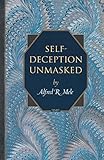Self-Deception Unmasked / Alfred R. Mele.
Material type: TextSeries: Princeton Monographs in Philosophy ; 6Publisher: Princeton, NJ : Princeton University Press, [2000]Copyright date: ©2001Edition: Core TextbookDescription: 1 online resourceContent type:
TextSeries: Princeton Monographs in Philosophy ; 6Publisher: Princeton, NJ : Princeton University Press, [2000]Copyright date: ©2001Edition: Core TextbookDescription: 1 online resourceContent type: - 9780691057453
- 9781400823970
- 128/.3 21
- BD439 .M45 2001eb
- online - DeGruyter
- Issued also in print.
| Item type | Current library | Call number | URL | Status | Notes | Barcode | |
|---|---|---|---|---|---|---|---|
 eBook
eBook
|
Biblioteca "Angelicum" Pont. Univ. S.Tommaso d'Aquino Nuvola online | online - DeGruyter (Browse shelf(Opens below)) | Online access | Not for loan (Accesso limitato) | Accesso per gli utenti autorizzati / Access for authorized users | (dgr)9781400823970 |
Browsing Biblioteca "Angelicum" Pont. Univ. S.Tommaso d'Aquino shelves, Shelving location: Nuvola online Close shelf browser (Hides shelf browser)

|

|

|

|

|

|

|
||
| online - DeGruyter The Politics of Institutional Choice : The Formation of the Russian State Duma / | online - DeGruyter War and Punishment : The Causes of War Termination and the First World War / | online - DeGruyter After Victory : Institutions, Strategic Restraint, and the Rebuilding of Order after Major Wars / | online - DeGruyter Self-Deception Unmasked / | online - DeGruyter Liberty Worth the Name : Locke on Free Agency / | online - DeGruyter Writing Outside the Nation / | online - DeGruyter Shakespeare's Brain : Reading with Cognitive Theory / |
Frontmatter -- Contents -- Preface -- CHAPTER 1. Introduction: Approaches, Puzzles, Biases and Agency -- CHAPTER 2. Garden-Variety Straight Self-Deception: Some Psychological Processes -- CHAPTER 3. Self-Deception without Puzzles -- CHAPTER 4. Attempted Empirical Demonstrations of Strict Self-Deception -- CHAPTER 5. Twisted Self-Deception -- CHAPTER 6. Conclusion -- Notes -- References -- Index
restricted access online access with authorization star
http://purl.org/coar/access_right/c_16ec
Self-deception raises complex questions about the nature of belief and the structure of the human mind. In this book, Alfred Mele addresses four of the most critical of these questions: What is it to deceive oneself? How do we deceive ourselves? Why do we deceive ourselves? Is self-deception really possible? Drawing on cutting-edge empirical research on everyday reasoning and biases, Mele takes issue with commonplace attempts to equate the processes of self-deception with those of stereotypical interpersonal deception. Such attempts, he demonstrates, are fundamentally misguided, particularly in the assumption that self-deception is intentional. In their place, Mele proposes a compelling, empirically informed account of the motivational causes of biased beliefs. At the heart of this theory is an appreciation of how emotion and motivation may, without our knowing it, bias our assessment of evidence for beliefs. Highlighting motivation and emotion, Mele develops a pair of approaches for explaining the two forms of self-deception: the "straight" form, in which we believe what we want to be true, and the "twisted" form, in which we believe what we wish to be false. Underlying Mele's work is an abiding interest in understanding and explaining the behavior of real human beings. The result is a comprehensive, elegant, empirically grounded theory of everyday self-deception that should engage philosophers and social scientists alike.
Issued also in print.
Mode of access: Internet via World Wide Web.
In English.
Description based on online resource; title from PDF title page (publisher's Web site, viewed 08. Jul 2019)


